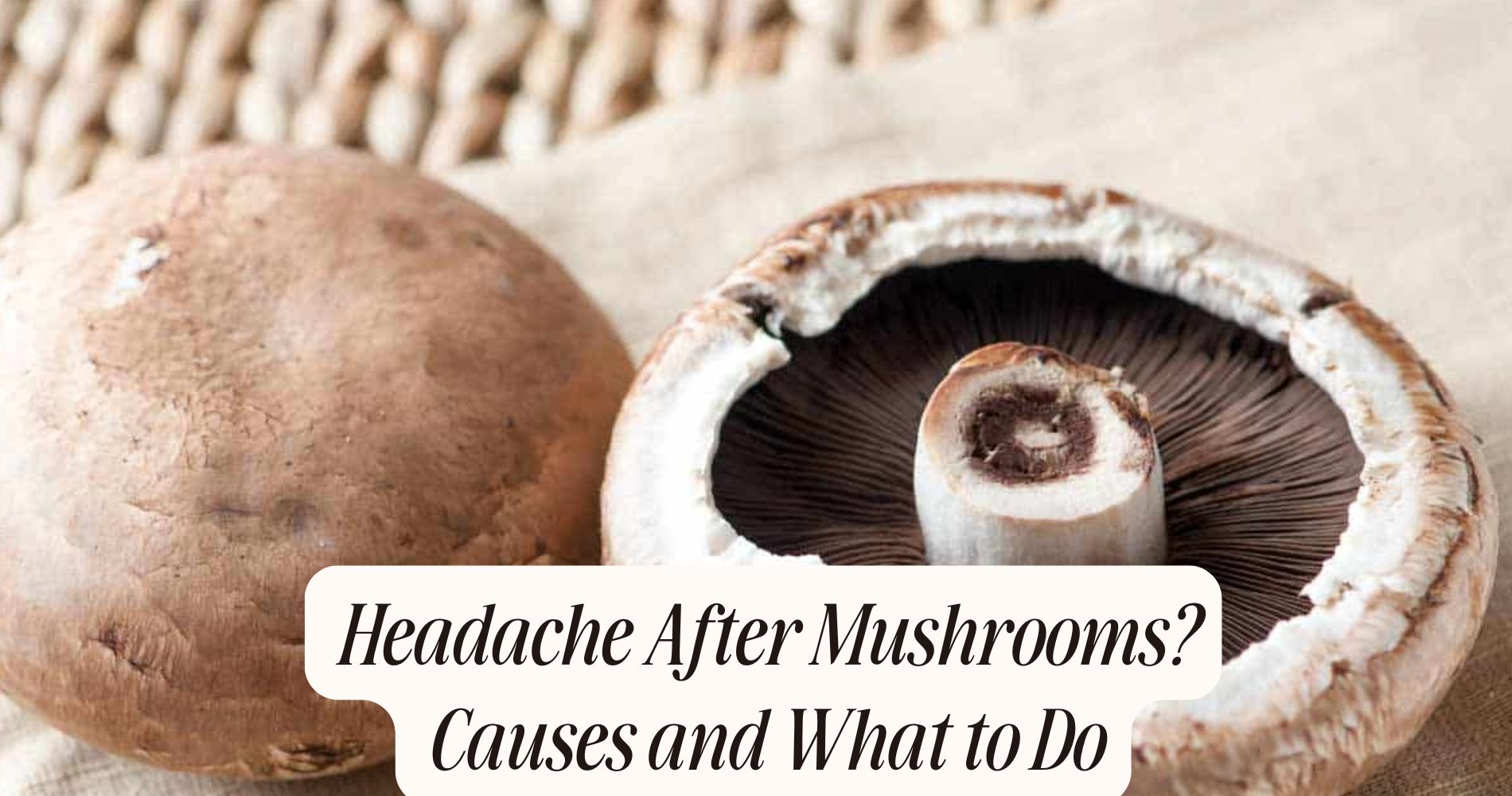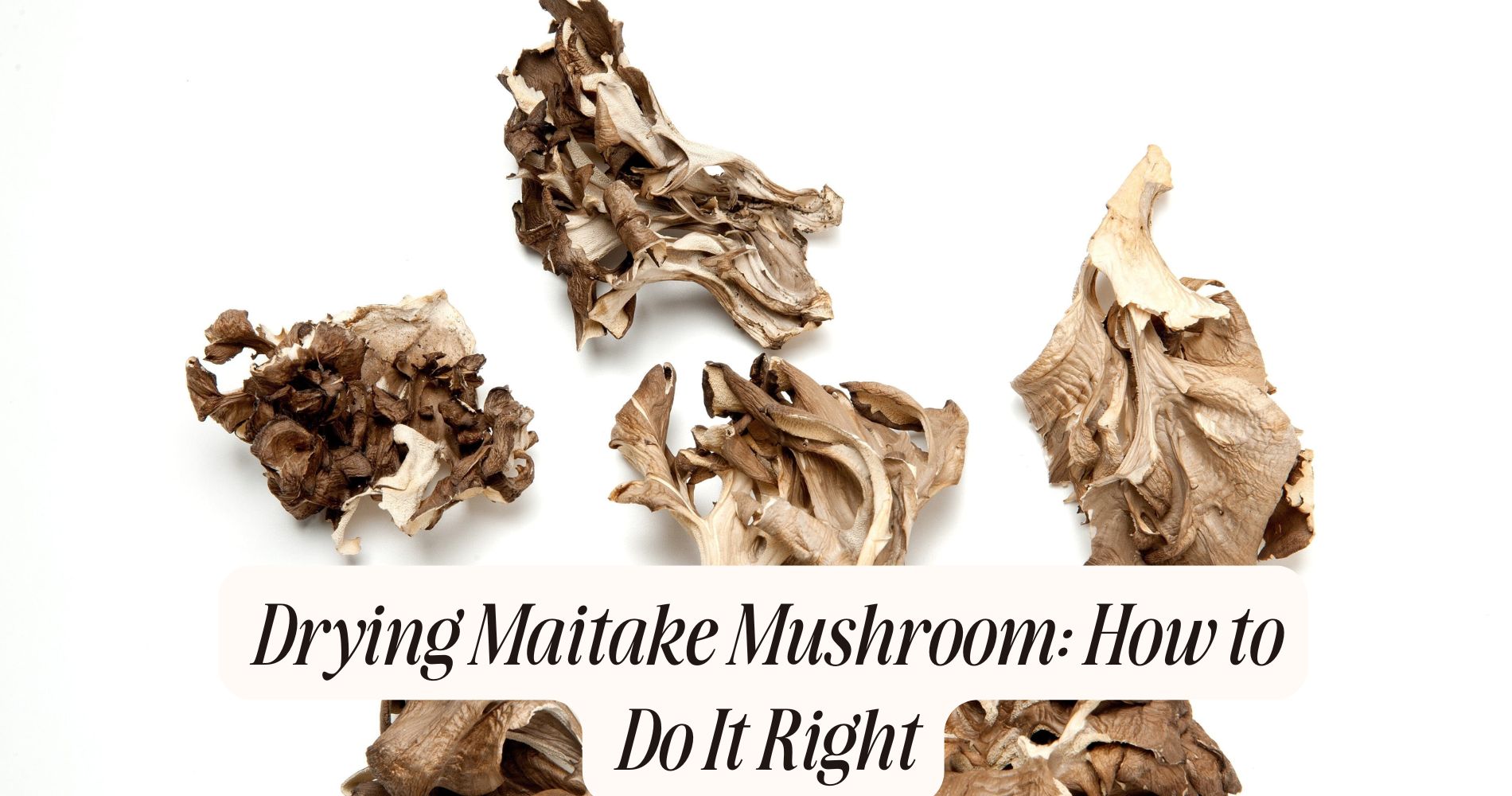
Headache After Mushrooms? Causes and What to Do
If you experience headaches after eating mushrooms, it could be due to factors like mushroom toxicity, food sensitivities, or dehydration. Certain mushrooms may trigger allergies or migraines in some individuals. Additionally, not staying hydrated can lead to headaches. Cooking mushrooms properly can reduce harmful compounds that might cause discomfort. If headaches persist or worsen, it's important to consult a healthcare professional. There are effective strategies for prevention and management that you might find useful.
Common Causes of Headaches After Eating Mushrooms
While mushrooms can be a delicious addition to your meals, they can also trigger headaches for some people.
One common cause of headaches is mushroom toxicity, particularly from certain wild varieties. Consuming these mushrooms can lead to adverse reactions, including headaches.
Additionally, some people may be sensitive to specific compounds found in certain mushroom varieties, like tyramine, which can also provoke headaches.

If you’re prone to migraines, it’s wise to be cautious with different mushroom types. Always make sure you’re consuming safe, edible varieties and avoid any that you can’t confidently identify.
If headaches persist after eating mushrooms, consider consulting a healthcare professional to rule out any underlying issues or sensitivities.
Dehydration and Its Impact on Headaches
Dehydration greatly contributes to headaches, often catching people off guard. When you consume mushrooms, you might forget to drink enough water, leading to an imbalance in your body’s hydration levels. This can trigger headaches due to reduced blood flow and nutrient delivery to the brain.
To combat this, you should adopt effective hydration strategies. Aim to drink water consistently throughout the day, especially before and after meals. Incorporating electrolyte-rich beverages can help maintain your electrolyte balance, which plays an essential role in preventing dehydration-related headaches.
Food Sensitivities and Allergies Related to Mushrooms
You mightn't realize that mushrooms can trigger food allergies or sensitivities in some people.
Symptoms like nausea, rashes, or headaches can indicate an adverse reaction.
Understanding common mushroom allergies and available testing methods can help you manage these sensitivities effectively.
Common Mushroom Allergies
Mushrooms can be a delicious addition to your meals, but they also pose risks for those with food sensitivities or allergies. Various mushroom types, such as shiitake, oyster, and button mushrooms, can trigger allergic reactions in some individuals.
Common allergy symptoms include skin rashes, itching, gastrointestinal distress, and respiratory issues. If you suspect you have a mushroom allergy, it's crucial to pay attention to how your body reacts after consuming different types.
Keep in mind that some people may be sensitive to specific mushroom varieties while tolerating others. Always consult with a healthcare professional for proper diagnosis and management.
Avoiding mushrooms altogether may be the safest option if you experience any concerning symptoms after eating them.

Sensitivity Symptoms Explained
While enjoying a meal with mushrooms, you might experience various sensitivity symptoms if you have a food sensitivity or allergy.
Different mushroom varieties can trigger reactions, and these symptoms may include headaches, gastrointestinal distress, or skin irritations. Individual tolerances vary widely; some people might react to specific compounds in mushrooms, while others may tolerate them well.
It's crucial to pay attention to your body's signals after consuming mushrooms, as reactions can differ based on the type of mushroom and your unique sensitivities.
If you notice consistent symptoms, it could be wise to limit your intake or avoid certain varieties altogether. Understanding your individual tolerances can help you enjoy mushrooms safely without unwanted side effects.
Diagnosis and Testing Methods
Identifying food sensitivities or allergies related to mushrooms often requires a systematic approach. Start by documenting your symptoms, including when they occur after consuming mushrooms. This information aids in differential diagnosis, helping to distinguish between a sensitivity and an allergy.
Consult a healthcare professional who may recommend allergy testing, such as skin prick tests or blood tests, to confirm any mushroom allergies. These tests measure your immune response to specific mushroom proteins.
If allergies are ruled out, you might explore food sensitivities through elimination diets, where you remove mushrooms from your diet and reintroduce them later while monitoring your reactions. This method provides insight into your body's response and helps determine the cause of your headaches.
The Role of Mushroom Preparation Methods
When you prepare mushrooms, the method can greatly affect their impact on your body.
Cooking mushrooms often breaks down toxins and makes nutrients more bioavailable, while consuming them raw may lead to adverse reactions.
Additionally, different drying techniques can alter the chemical composition, potentially influencing headache occurrences.
Cooking vs. Raw Consumption
Although many enjoy mushrooms raw for their unique flavors and textures, cooking them can greatly alter their effects on the body, including potential headaches.
Raw mushrooms offer nutritional benefits, such as high fiber and antioxidants, but they can also contain toxins that cooking helps eliminate.
Different cooking methods—like sautéing, steaming, or roasting—can break down these harmful compounds, making the mushrooms more digestible and less likely to cause adverse reactions.
Additionally, cooking enhances the bioavailability of certain nutrients, ensuring your body can absorb them effectively.
If you've experienced headaches after consuming raw mushrooms, consider trying cooked varieties instead. This simple change might help you enjoy mushrooms without the discomfort.
Always prioritize preparation methods for a healthier dining experience.
Drying Techniques Impact
While you may enjoy the convenience of dried mushrooms, the drying techniques used can greatly impact their effects on your body, including the potential for headaches.
Different drying methods, such as air-drying, sun-drying, or using dehydrators, can alter the moisture content and concentration of active compounds in mushrooms. For instance, rapid dehydration might preserve certain nutrients but could also lead to a higher concentration of compounds that trigger headaches.

Proper mushroom preservation is essential; slow drying may retain beneficial properties while minimizing adverse effects.
Always consider the method used when selecting dried mushrooms, as it plays a fundamental role in how your body reacts to them, potentially affecting your overall experience and well-being.
Tips for Preventing Headaches After Mushroom Consumption
To prevent headaches after consuming mushrooms, start by choosing the right types and preparing them properly. Certain mushroom varieties, like shiitake and portobello, are less likely to trigger headaches compared to others, such as chanterelles.
Always wash your mushrooms thoroughly to remove any potential contaminants that could act as headache triggers. Cooking them well can also help, as it breaks down certain compounds that might cause discomfort.
Stay hydrated before and after your meal, as dehydration can contribute to headaches. Pair mushrooms with magnesium-rich foods, like spinach or nuts, which may help mitigate headache risks.
Finally, pay attention to your body’s reactions; keeping a food diary can help identify specific mushroom varieties that may lead to headaches for you.
When to Seek Medical Attention for Persistent Headaches
When should you consider seeking medical attention for persistent headaches? If your headaches last more than a few days or worsen over time, it’s time to consult a healthcare professional.
Pay attention to any accompanying symptoms such as vision changes, nausea, or neurological issues, as these can indicate more serious conditions.
Additionally, if you notice specific headache triggers that seem to correlate with your symptoms, mention them during your medical evaluation.

It’s essential to rule out underlying health concerns, especially if headaches disrupt your daily life.
Don’t ignore severe headaches that feel different from your usual episodes, as they may require immediate attention.
Prompt medical evaluation can help you find relief and address any potential complications.
Support Your Well-being with SUPER MUSHROOM GUMMIES
If you’re looking for a convenient and tasty way to enjoy the benefits of mushrooms without the risk of headaches, Well Gummies' SUPER MUSHROOM GUMMIES are the perfect solution! Packed with 10 types of functional mushrooms, these vegan gummies naturally fuel your brain, enhance focus, and support immune health. With a fresh wild berry flavor, they taste just like your favorite candy—without the jitters or crash. Energize your body and mind all day long with SUPER MUSHROOM GUMMIES, a safe and delicious way to boost your wellness!
Frequently Asked Questions
Can Certain Mushroom Types Cause Headaches More Than Others?
Certain mushroom varieties can indeed trigger headaches more than others. Factors like histamine levels and individual sensitivities contribute to these headache triggers. It is crucial to monitor your reactions to different types to identify potential culprits.
Are There Any Specific Symptoms of Mushroom-Related Headaches?
You might experience symptoms like nausea, dizziness, or sensitivity to light with mushroom-related headaches. These can stem from mushroom toxicity or allergic reactions, highlighting the need for caution when consuming unfamiliar mushroom varieties.
How Long Do Mushroom-Induced Headaches Typically Last?
Mushroom effects can vary, but headache duration typically lasts from a few hours to a couple of days. Individual responses differ based on factors like dosage and personal sensitivity, so you should monitor your symptoms closely.
Is There a Correlation Between Mushroom Consumption and Migraines?
Yes, there's a potential correlation between mushroom compounds and migraines. Certain compounds may trigger headache mechanisms in sensitive individuals, leading to migraine episodes. It's crucial to pay attention to your body's reactions after consuming mushrooms.
Can Over-The-Counter Medications Help With Mushroom-Related Headaches?
Yes, over-the-counter medications can provide pain relief for mushroom-related headaches. Just make certain you follow dosage guidelines on the package. If headaches persist, consult a healthcare professional for further evaluation and tailored advice.
Conclusion
In conclusion, if you experience headaches after eating mushrooms, consider factors like dehydration, food sensitivities, and preparation methods. Staying hydrated and paying attention to how your body reacts can help prevent these headaches. If your headaches persist or worsen, it's essential to seek medical advice to rule out any serious conditions. By being mindful of these aspects, you can enjoy mushrooms without the discomfort of headaches.




